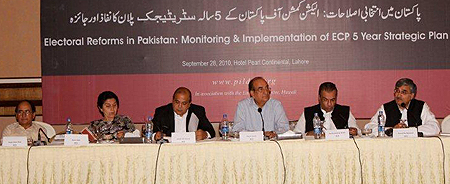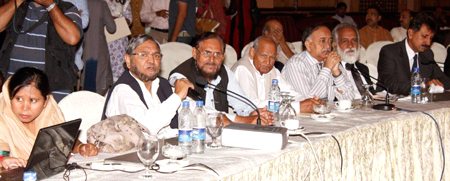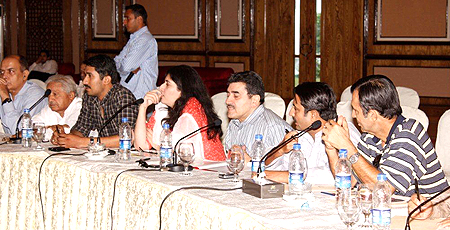|
|
| |
| EVENTS |
|
|
> ECP should speed up the process of Electoral reforms: PILDAT Roundtable reviews progress on ECP Strategic Plan
|
| |
|
PILDAT Roundtable Discussion
September 28, 2010
Lahore
|
|
| |
Lahore, September 28: In the Roundtable Discussion on the Electoral Reforms in Pakistan: Monitoring and Implementation of the ECP 5 Year Strategic Plan organised by Pakistan Institute of Legislative Development and Transparency-PILDAT, representatives of the Civil Society, Media, analysts, and academia urged the ECP to speed gear up the process of electoral Reforms as this is the right time to introduce the required reforms in the electoral process. |
|
| |
Members of the Citizens Group on Electoral Process-CGEP including Mr. Shahid Hamid, Former Governor Punjab, Dr. Hasan Askari Rizvi, Political Analyst, Mr. Mujib ur Rehman Shami, former President APNS and CPNE , Justice Nasira Iqbal, participated while Sheikh Jalil Ahmed, Deputy Secretary ECP represented the Election commission at the forum.
|
|
| |
Sheikh Jalil Ahmed, Deputy Secretary, ECP said that the ECP 5 Year Strategic Plan is a significant document in the history of ECP as well as of Pakistan. Talking about the goals mentioned in the 5 Year Strategic Plan Sheikh Jalil said that ECP website has extensive information about elections but ECP is not authorized to upload assets declarations of the Parliamentarians and Political Parties on the ECP website unless the Parliament pass a legislation on the matter. Many participants including the prominent lawyer Shahid Hamid disagreed with the ECP representative�s interpretation and thought tha no legislation is needed to upload a public document on the website. ECP representative hoped that all major reforms envisaged in the 5-year Strategic Plan would be implemented well before the next general election scheduled to be held in 2013. He was confident that the next election would be credible and fair.. He also informed the participants that the ECP had conducted a study to introduce Electronic Voting Machine-EVM and ECP intended to use the EVM in at least some provinces or districts in the next General elections. |
|
| |
He further explained that ECP and NADRA were collaborating in making computerized Electoral Rolls System �CERS for which the Chief Election Commissioner has set the deadline of October 31, 2010 to accomplish the pilot project in selected districts. Legislation is again pending in the Parliament to make mandatory condition of using CNIC during registration as voter and at the time of casting vote, ECP has sent a bill to the Prime Minister Secretariat to make mandatory use of CINC in elections. |
|
| |
Mr. Ahmed Bilal Mehboob, Executive Director-PILDAT in his presentation gave a comparison of the CGEP proposed Electoral reforms and Goals represented in the ECP 5Year Strategic Plan 2010-2014. ECP has launched a Strategic Plan with 15 major goals and 129 objectives. Out of 129 objectives 18 objectives were to be achieved by September 2010 and 28 objectives need to be achieved in next 6 months. The ECP is committed to achieve a total of 43 objectives before the end of 2010. |
|
| |
Analysing the ECP Strategic Plan he said that some major and necessary reforms objectives have not been achieved by the agreed deadlines like legislation on the mandatory use of CNIC in elections, simplification of voters registration form, designation of officers to deal with pre-poll, poll-day and post-poll complaints at the ECP/PEC offices and Publish financial statements of Parliamentarians and Political Parties on ECP website while these statements are already available in printed form. |
|
| |
Dr. Hasan Askari Rizvi, member of the Citizens Group on Electoral Process, while giving his comments on the topic said that democracy is based on the credible and free and fair elections and currently we are facing the problem of bogus and faulty voters lists. There is a lot said about these electoral rolls but these theories should be immediately translated into practice. |
|
| |
Justice Nasira Iqbal said that while we are talking about new reforms there is hardly any implementation of already available laws. Executives violate these laws by while participating in the election rallies and election campaigns using state resources. ECP should strongly act to implement the laws and punish the violators. |
|
| |
Political will is required to introduce and promote electoral reforms in the country, said Mr. Mujib ur Shami in the Roundtable Discussion. We have wasted a long time in those matters which are achieved by our neighbouring countries in a much shorter time like photo electoral rolls are already introduced in Bangladesh while we are in the process of conducting feasibility studies, Mujib Shami said that Election rigging, corrupt practices during elections and non-implementation of prescribed punishments has become a part of our political culture and we need to change this culture that is, unfortunately not possible without political will.
Mr. Shami also criticized the ECP point of view that legislation is required to display statements of assets and liabilities of the legislatorial parties on the ECP website as these are public documents and can be uploaded on the website without the need of any legislation.
Mr. Shahid Hamid in his concluding comments said that polling staff appointed during elections should not be from the same province because the local staff is more vulnerable to the influence of local and provincial governments. He said that almost 25% electoral rolls contain bogus or fake entries and this is also the cause of lower voter turnout in our elections. He further said that many reforms are incorporated after 18th amendment of the Constitution but mere incorporation is not sufficient unless practical implementation of these reforms is undertaken.
During Discussion participants gave many suggestions to improve electoral rolls and said that computerized, error-free, picture-bearing electoral rolls prepared in conjunction with NADRA database and using the CNIC number as unique identifier was a basic requirement of free and fair election and that the ECP should focus on this task. The participants also proposed permanent polling stations, no change in the polling station after announcement of election, neutral care taker government, ECP�s strict role in controlling the election expenses. All participants were unanimous in declaring that a strong and non-partisan Election Commission is the key to free and fair election and its formation should be completed urgently in accordance with the 18th constitutional amendment.
The PILDAT Briefing has been organized under project titled Electoral and Parliamentary Process and Civil Society in Pakistan, in partnership with the East-West Centre, Hawaii and supported by the United Nations Democracy Fund. |
|
| |
|
|
| |

|
|
| |
|
|
| |

|
|
| |
|
|
| |

|
|
|
|
|
|
|
|
|